When choosing your music or drama degree, it’s important to choose the right institution for you and your future career. Both conservatoires and universities offer these options for training, but what’s the difference? What does a conservatoire offer that you might not find in another higher education institution?
A conservatoire is a specialist institution, which trains students in music and performing arts. Conservatoires often have a practical focus with professional musical tuition, and bespoke facilities. They are also industry-focused, which means the environment mirrors the experience of working within the arts.
Leeds Conservatoire is one of 11 conservatoires in the UK, providing degrees across a range of areas. This includes Classical, Jazz, Popular, Music Production, Musical Theatre, Acting, Actor Musician, Film Music, Songwriting, Folk, Music Business.
Benefits of studying at a conservatoire
- A bespoke environment
- Expert one-to-one tuition
- Conservatoire facilities
- Preparing for industry
- Masterclasses with industry professionals
- Performance opportunities
A bespoke environment
Leeds Conservatoire was the first UK conservatoire to offer degrees in both Music Production and Music Business alongside traditional performance-led courses.
This means that all aspects of the industry are together under one roof. “You can easily access producers, string quartets, brass sections, a manager or a promoter,” explains Programme Leader for Songwriting, Danny Cope. Whatever band or project you’re involved in, you will have ready-made contacts to work with throughout your study.
This progressive conservatoire approach poses endless opportunities to work with different styles and genres. Jazz student Alex Miller notes; “You are literally immersed into a community full of musicians here, so you are bound to join different bands and have lots of opportunities to play with other people and develop.”
"One of the best things about this conservatoire is the opportunity to collaborate with so many different people studying different disciplines," adds Musical Theatre student Niamh Hendron.
The bespoke environment spans everything from teaching and facilities, right through to the student wellbeing team. Our services are especially tailored towards performers – such as the Alexander Technique – a complementary therapy designed to help with performance anxiety.
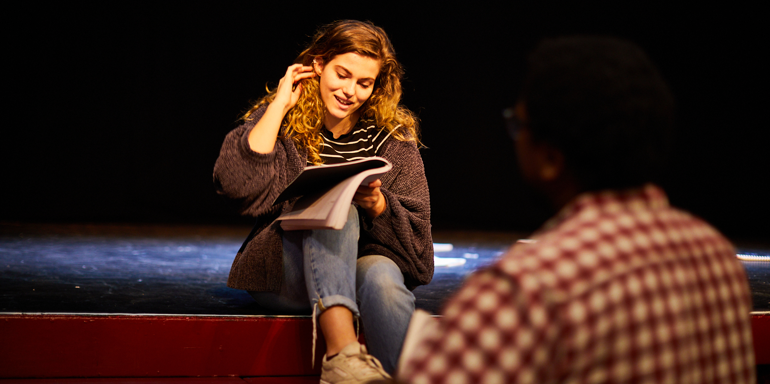
Expert one-to-one tuition
A defining element of conservatoire education is one-to-one tuition. At Leeds Conservatoire, you will get regular one-to-one tuition with a leading specialist who works in the creative industries.
“All the tutors at Leeds Conservatoire work in the industry as well,” explains Danny Cope. “Staff not only develop their own careers, but they bring these experiences into the classroom too. As a student you get real, fresh insight on a weekly basis into the current developments within the industry.”
“That’s what coming to a conservatoire is all about” agrees Programme Leader for Jazz Jamil Sheriff. “You are working with professional musicians who are able to give you that impetus and experience, and talk about their day to day projects – all of that currency feeds into the curriculum.”
Folk student Maddie Morris says that the teaching at the conservatoire was a deciding factor in choosing where to study; “The teaching format at Leeds Conservatoire was one of the reasons I chose to come here. The conservatoire way of doing things with one-to-one tuition is a lot better for me. The lecturers are friendly and if you don’t understand something you can just ask. The quality of teaching has gone above and beyond anything I’ve ever experienced as a musician.”
Musical Theatre student Alex Terry adds; “The tutors are amazing – they are all active in the industry and they know what we need to be successful in this world - being able to learn from their expertise has helped me progress my skills so much.”
In addition to developing technically, one-to-one tuition can be key in helping students find their place within the music industry. Classical student Jack Stote observes: “I’ve learned from my one-to-one tuition that it’s really important to establish my own compositional voice – this is really important to me as an up-and-coming composer.”
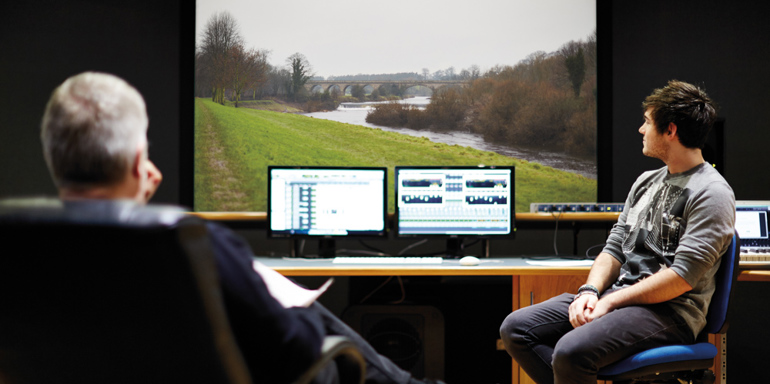
A Film Music one-to-one in our 5.1 surround sound studio
Weekly one-to-one tuition extends to non-performance based courses too, offering guidance and feedback on different aspects of music education.
Film Music student James Jarvis says; “For that hour each week you get to show your work and get feedback – it’s one of the best things about the course. The knowledge our lecturers have from the projects they’ve worked on – that’s feedback that you couldn’t really get anywhere else.”
Music Business students also have an hour of one-to-one tuition each week, to gain guidance and support on any project that they might be working on. Nick Simcock, lecturer on Music Business explains; “You can focus on what you want to get out of the course – whether you’re trying to launch your own business or want to work in a certain sector of the music industry, it’s your opportunity to direct the curriculum – and we can help mentor and coach you through that.”
One-to-one tutors can also provide guidance in general study skills and personal development, which Popular Music student Lauren Rycroft has found invaluable; “My one-to-one tutor has really inspired me to grow, prioritise and structure my time better. Even when I decided to change course last year, he guided me through that process and made everything straight-forward.”
Music Production students undertake specialist study – small group tuition in analogue and digital recording techniques. First year FdA Production student Charlotte Tomaney has found the tuition to be excellent; “The tutors are great – I always feel like I’ve had their support when I’ve needed it. There’s also plenty of time out of lessons to use the facilities to develop your own projects.”
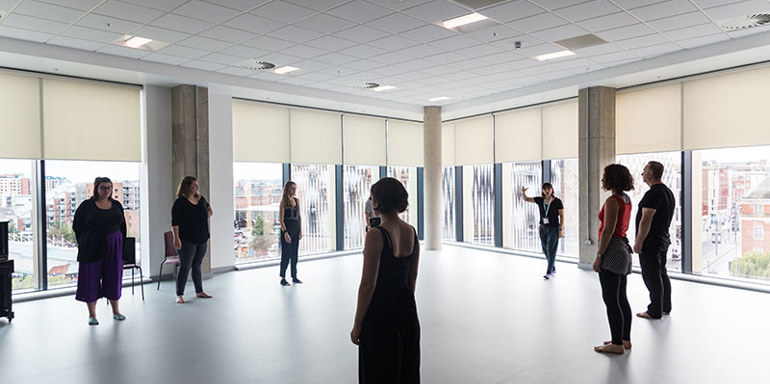
Our state-of-the-art dance and drama studios
Conservatoire facilities
Studying at a conservatoire means that you will have access to state-of-the-art, industry-standard facilities. At Leeds Conservatoire, students use the highest quality facilities including recording studios, well-equipped practice rooms, Mac labs, portable recording rigs, a brand new library, Business Hub and state-of-the-art performance spaces.
Built brand new in 2019, Musical Theatre, Acting and Actor Musician Students will have access to two large dance studios, three drama rehearsal rooms, a rehearsal studio with staging, performance lighting and sound, with panoramic city views in a new building containing a 180-seat theatre at our Playhouse Square location.
Our studios are industry-standard, and “second-to-none” says Bhupinder Chaggar, Curriculum Co-ordinator for Music Production. “We cover a lot of ground and wide range of music production because we are a stand-alone conservatoire that is able to provide the music, the material and the resources all under one roof.”
Our studios stay open until late – which helps students make the most out of their time at Leeds Conservatoire. Student Alex Miller says; “It’s really useful that the facilities are open for so long – you can come in and jam loads, and you can get a lot of practice time which allows you to develop and hone your skills.”
State-of-the-art studios aside, the conservatoire also offers a bank of instruments available for students to hire out – something which student Maddie Morris describes as “like being a kid in a candy shop.”
Colleen Lloyd, Curriculum Manager for Music Business notes that the “library, music scores, books and Business Hub where you can have meetings and use as an organisational space,” are a valuable addition to the Leeds Conservatoire offering too – taking into account the unique needs of Music Business students.
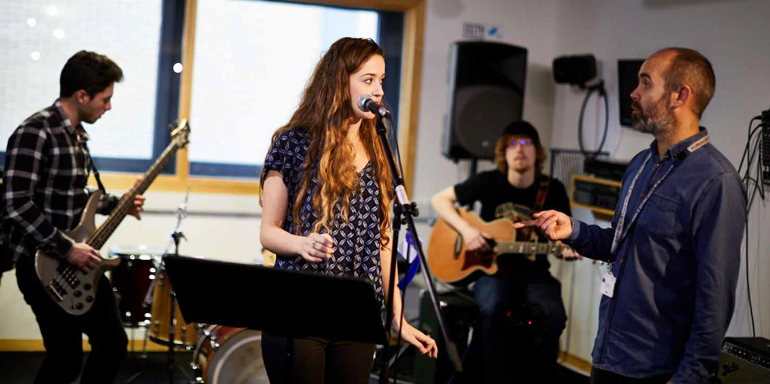
Preparing for industry
Studying at a conservatoire should be an opportunity to kick off your music or performing arts career whilst you study. Programme Leader for Songwriting, Danny Cope says; “The idea is that when students’ graduate they are already up and running with a strong network of people and a good understanding of how the industry works – so it’s a step forward in continuing their career, rather than starting from scratch.”
Student Lauren Rycroft has first-hand experience of this; “Since coming to Leeds Conservatoire I’ve been able to launch myself as an artist – I’ve had loads of opportunities to gig, recorded and released an EP which generated interest from BBC Introducing, and I have even supported Newton Faulkner.”
In a conservatoire you will gain the practical knowledge and skills required to go on to build a sustainable career which is likely to span a range of areas within your chosen industry. Around 80% of our students go on to work in the creative industries, and 97% are in work or full time study 6 months on from graduating from the conservatoire (DLHE 2017).
The professional studies module is an intrinsic part of Leeds Conservatoire study, covering many useful aspects of working in the industry – from being self-employed and doing your tax returns, understanding contract law, marketing and self-promotion.
“We instill an entrepreneurial spirit from day one,” explains Colleen Lloyd. “Understanding and learning about collaboration, learning how to work with people and develop and maintain relationships outside of the conservatoire are incredibly important transferrable skills for the industry.”
Third year Songwriting student Tom Harvey has found the Professional Studies strand particularly useful in setting up for his career; “modules such as self-promotion have been great. It’s a different outlook on music that’s not just based around performance – and helps give you the skills to adapt when you leave the conservatoire. I also think that the policy that Leeds Conservatoire has in terms of not taking any copyright from students and songwriters is great – it especially helps me because I’m a songwriter and this is what I want to do when I leave the conservatoire.”
Student Jack Stote has found these modules particularly helpful too; “Working in the Creative Industries got to help me see how different genres work within the music industry. Other modules have really helped me shape what I want to do when I graduate – such as Introduction to Music Tuition, which is perfect for me as I want to go into teaching.”
In addition to preparing our students for industry within the curriculum, our location in Leeds provides prime opportunities for networking. “Leeds Conservatoire is surrounded by an incredible array of leading culture and arts institutions – from the city’s internationally renowned Ballet and Opera companies, to the impressive array of gig venues, theatres and media outlets” says Professor Joe Wilson, Vice Principal and Director of Curriculum at Leeds Conservatoire. "It provides an inspirational environment in which to study and make professional connections - the perfect backdrop to studying any aspect of music from Classical to Musical Theatre, Pop or Production.”
Masterclasses with industry professionals
As a student at Leeds Conservatoire you will have access to a range of masterclasses taught by influential professionals from across the whole spectrum of the music industry. Any student from any pathway can attend masterclasses of different genres – so your in-depth learning isn’t just limited to one genre or topic.
“A stand out masterclass for me has been the Tunde Jegede session” says Classical student Mimi Harmer. “There were loads of different instrumentalists there and we did improvisation based around African themes and African rhythms – it was just amazing.”
“Whatever programme you are on it adds depth to your study,” adds Colleen Lloyd “Speaking to people who are out there working in the industry and who are willing to give advice is a great opportunity to network and make connections with people who are working in your industry.”
It’s these connections that can really make a difference to a student in their formative careers too – as second year Film Music student James Jarvis explains; “The connections we make here and the people we’re able to meet are quite extraordinary. The industry guests who come in are working in TV and film - that’s something you don’t really get anywhere else. I got to show some of my work to Nicholas Dodd who has orchestrated on films from James Bond to Independence Day.”
Curriculum Manager for Songwriting Adam Martin goes as far to say that Masterclasses are “inspirational stories from industry professionals about their journeys – and students quickly see that this could be a journey that they could easily take.”
It's not just UK-based guests that students can hear from. Technology allows students to benefit from advice from experts worldwide, such as the recent Performing Arts masterclass from award-winning actor, producer, writer and director Colman Domingo - live from the US.
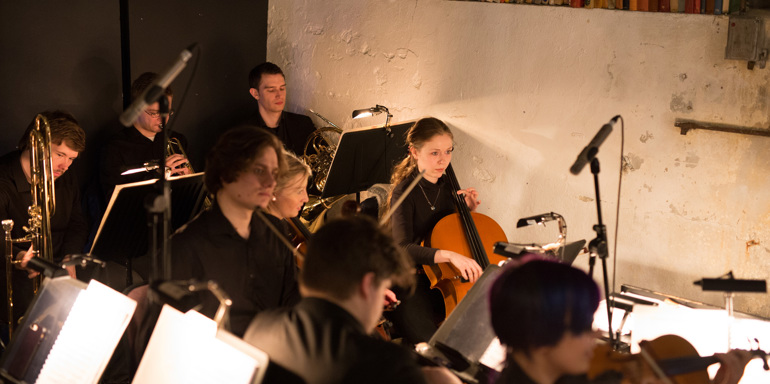
Mimi Harmer performing with Leeds Conservatoire's Chamber Orchestra in The Paradise Club
Performance Opportunities
A huge part of studying at a conservatoire is performing – and as a student at Leeds Conservatoire you’ll have plenty of opportunities, both within our professional performance spaces and across the varied music venues in Leeds.
Classical student Mimi Harmer says “For Classical students there are plenty of opportunities for performance – I’ve played at diverse venues such from Wakefield Cathedral to Brudenell Social Club with pop bands. I also performed as part of the Chamber Orchestra with Charlie Siem – it was amazing to have such a virtuosic and talented violinist work with us.”
There are regular Jazz (B-Side) and Pop & Production (Crosswire) showcase nights at the conservatoire, and lots of ensembles or orchestras that students can join, such as the Chamber Orchestra, New Music Collective and Contemporary Pop Choir.
Pop student Becky Bowe was a member of the Pop choir which led to her joining Leeds Contemporary Singers – the Leeds Conservatoire group who won the first ever round of BBC1’s Pitch Battle. “Pitch Battle was a whirlwind – one day I was sat in a lecture, the next I was filming in Manchester. It was such a great experience – and I really developed in terms of performing in a group.”
Leeds Conservatoire has its own Artistry and Enterprise Schemes – which allow students to bid for funding and mentoring in artist development, putting on tour or developing a business idea. Enterprise Co-ordinator James Warrender says; “We have helped so many artists with early career development, such as Lucy Whittaker, Caro and SaNTINO – all of whom came through the enterprise scheme. We supported them with booking gigs, tour management, and promotion, as well as financial support for touring their music across the country to a whole new audience.”
Leeds Conservatoire also has partnerships with large festivals, and in recent years’ students have performed at Liverpool Sound City, Manchester Jazz and Leeds Festival.
Interested in finding out more about studying at Leeds Conservatoire? Visit our course pages or book an open day.






